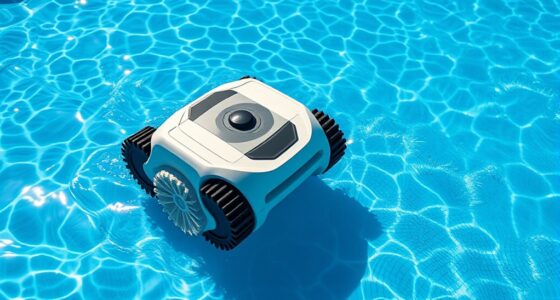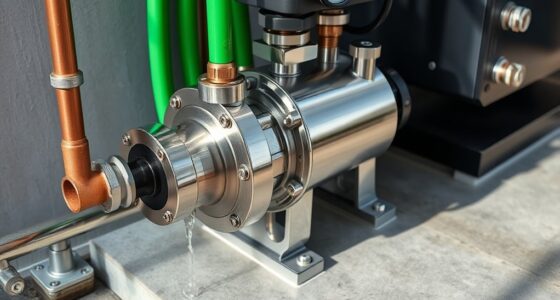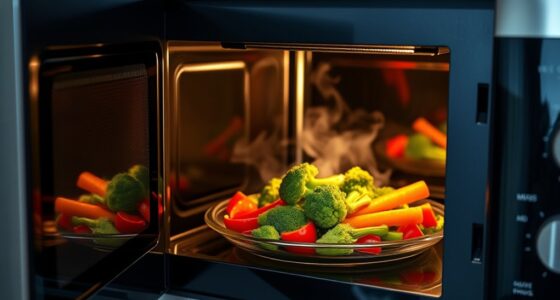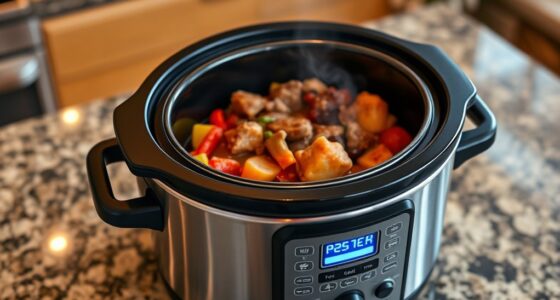Pressure pool cleaners are simple and cost-effective, but they require manual setup and occasional monitoring. You can target specific areas and control cleaning schedules, but they rely heavily on your pool’s circulation system to work effectively. Proper water chemistry and maintenance improve their performance, which can help save energy and reduce costs. However, they’re not fully automated and may need troubleshooting. If you want a clearer picture of their advantages and drawbacks, keep exploring the details below.
Key Takeaways
- Require manual setup and monitoring, offering control but needing user effort during operation.
- Depend on pool circulation, so water flow quality significantly impacts cleaning effectiveness.
- Can be energy-efficient with proper circulation, reducing operational costs compared to more automated cleaners.
- Need regular maintenance and water chemistry checks to ensure optimal performance.
- Provide targeted cleaning and flexible scheduling, but are less autonomous than robotic pool cleaners.
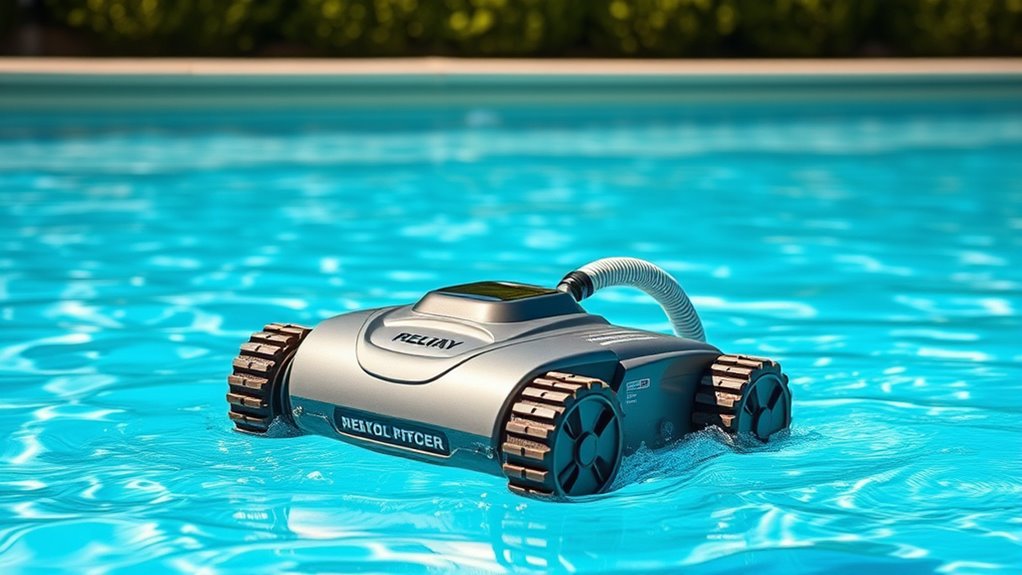
Pressure pool cleaners are popular tools for keeping your pool spotless, but they come with their own set of advantages and disadvantages. One key aspect to contemplate is manual operation. These cleaners typically require you to set them up and sometimes monitor their progress, especially with models that need manual placement or adjustments during cleaning cycles. Unlike robotic cleaners, which operate independently, pressure cleaners depend on your involvement to get started and sometimes to troubleshoot if issues arise. This means you’ll spend some time positioning the cleaner correctly and ensuring all hoses are connected securely. While this might seem like extra effort, it also gives you control over when and where the cleaner works, which can be beneficial if you’re looking to target specific areas of your pool. Additionally, the effectiveness of pressure cleaners can be influenced by the pool’s circulation system, which plays a crucial role in moving debris efficiently. Proper circulation can improve cleaning performance and reduce the workload on the cleaner itself. Using a well-maintained circulation system can optimize the water flow, making the cleaning process more effective and efficient. Maintaining pool water chemistry is also important to prevent debris buildup and ensure the cleaner works optimally. Furthermore, understanding the energy consumption of these cleaners can help you manage operational costs more effectively.
Frequently Asked Questions
How Long Do Pressure Pool Cleaners Typically Last?
Pressure pool cleaners typically last around 3 to 5 years, but durability concerns can affect this lifespan. Regular maintenance helps extend their life, preventing wear and tear. Keep in mind, replacement costs can add up if you neglect repairs or ignore signs of declining performance. You should monitor your cleaner’s condition closely, ensuring it functions effectively longer and saves you money in the long run.
Are Pressure Pool Cleaners Compatible With All Pool Types?
You’ll find that pressure pool cleaners vary in pool surface compatibility; some work well on concrete, plaster, or vinyl, while others may not be suitable for certain surfaces. Additionally, cleaner attachment types differ, so you should check if the model you select is compatible with your pool’s surface and existing equipment. Always verify these factors before purchasing to guarantee effective cleaning and avoid potential damage to your pool.
What Maintenance Is Required for Pressure Pool Cleaners?
Did you know that regular maintenance can extend your pressure pool cleaner’s lifespan by up to 50%? You should check and clean the filter bag weekly to guarantee peak performance. Inspect the hose for cracks or leaks and replace if necessary, as hose durability is key to effective cleaning. Also, keep the internal components free of debris to prevent clogs and maintain consistent suction.
Can Pressure Pool Cleaners Handle Algae or Heavy Debris?
You might wonder if pressure pool cleaners can handle algae removal or heavy debris. They’re effective for cleaning algae buildup, especially with proper pre-treatment, and can tackle heavy debris like leaves and twigs. However, for stubborn algae or large debris, you may need to manually assist or use specialized tools alongside the cleaner. Overall, pressure cleaners are versatile but might require extra effort for extreme cases.
Do Pressure Pool Cleaners Increase Energy Consumption Significantly?
You might wonder if pressure pool cleaners increase energy consumption considerably. They do tend to use more energy compared to robotic cleaners, which can impact your overall energy efficiency. The cost impact varies depending on your cleaner’s power and usage frequency. While they’re effective at cleaning, keep in mind that higher energy use could mean higher utility bills. To save, consider models with energy-efficient features to balance performance and cost.
Conclusion
Ultimately, pressure pool cleaners are your trusty sidekicks, sweeping away debris like a breeze through a forest. They’re powerful allies that can make your pool sparkle, but they might also be a bit stubborn or noisy, like a restless beast. Weigh their strengths and quirks carefully—think of them as a dance partner with a wild streak. With the right rhythm, they’ll keep your pool gleaming and inviting, turning maintenance into a smooth, effortless waltz.


